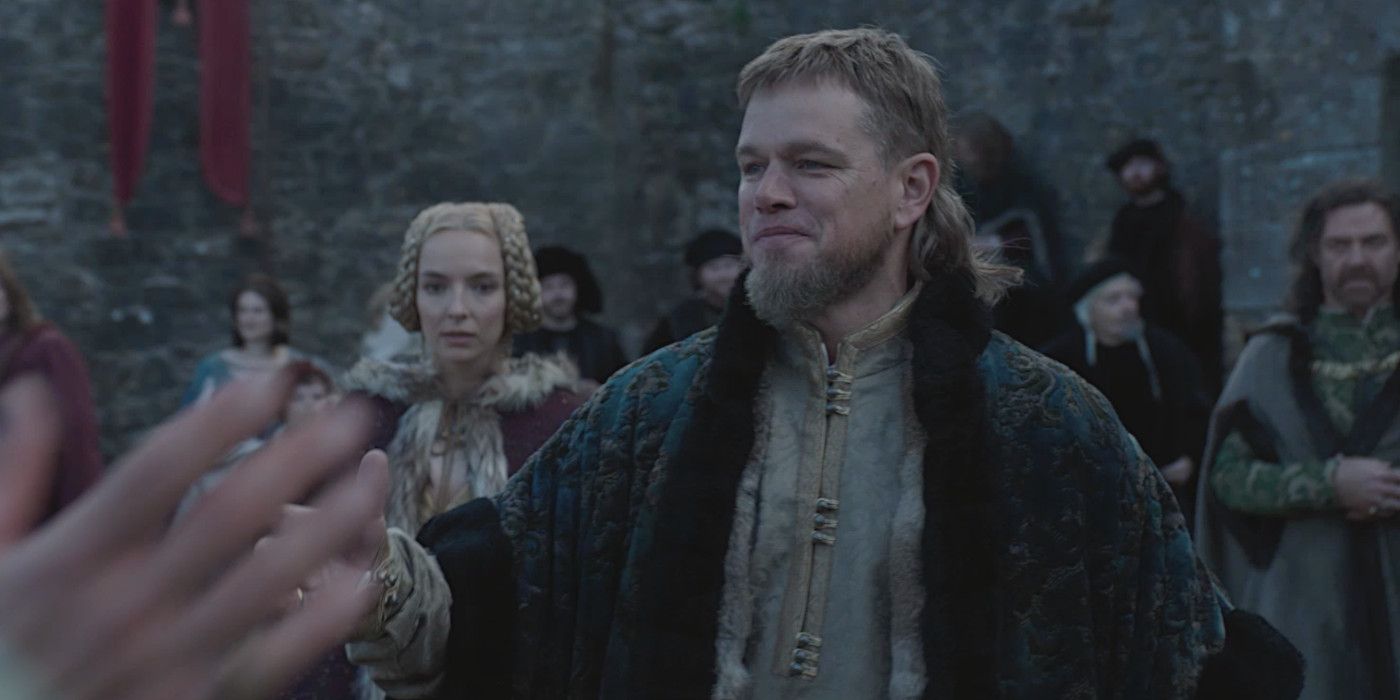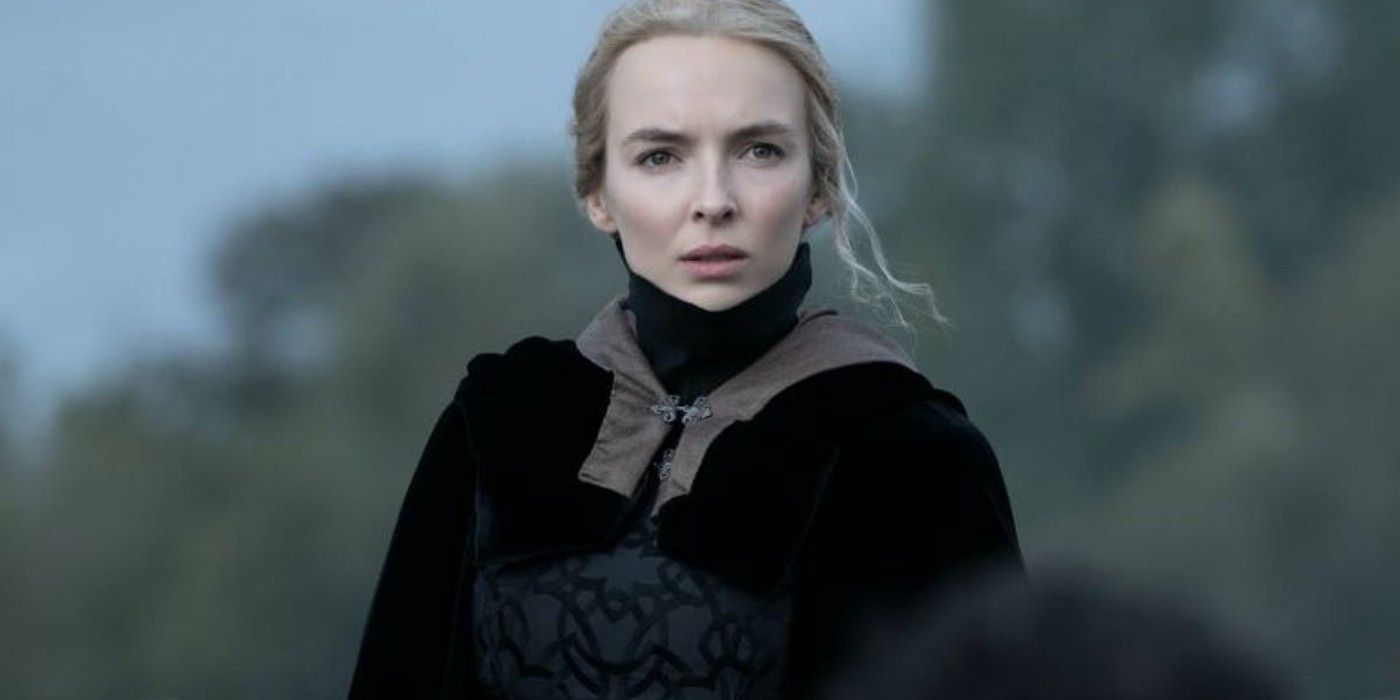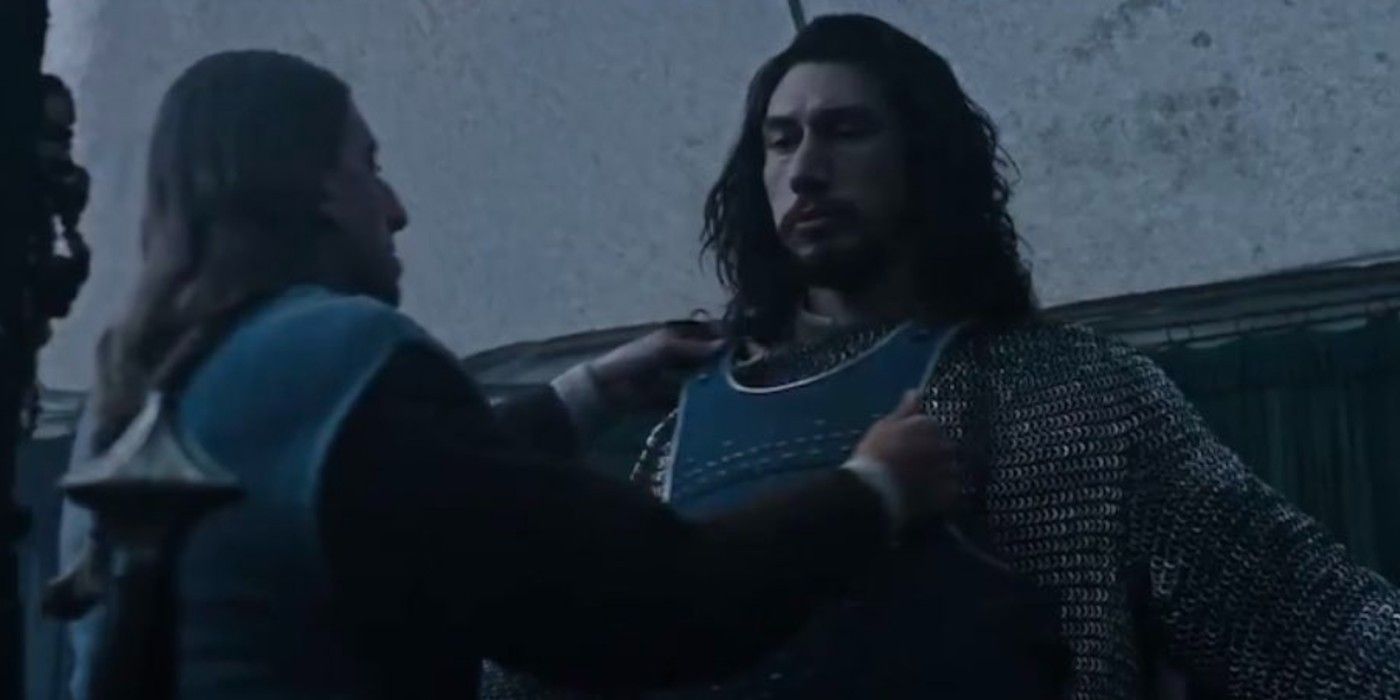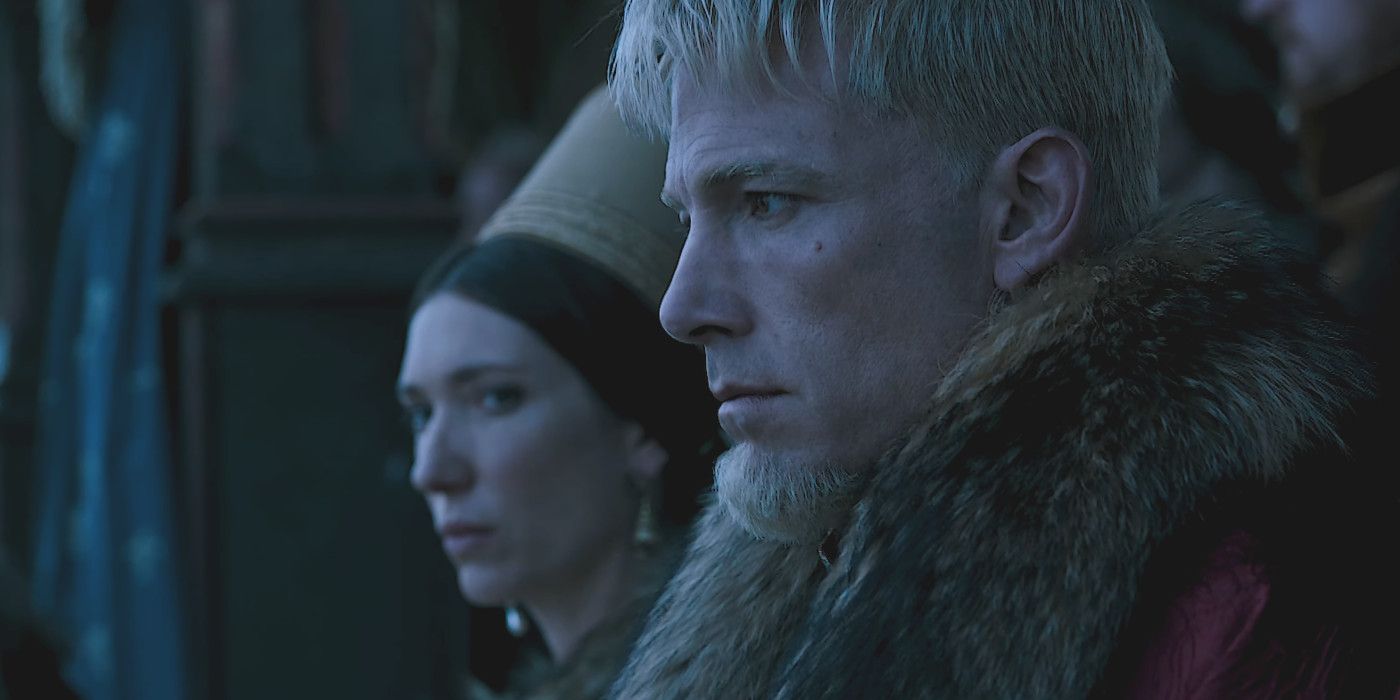
Ridley Scott’s The Last Duel is based on a true historical account of the last legally sanctioned judicial duel in French history. Starring Matt Damon, Ben Affleck, Jodie Comer, and Adam Driver, the film uses this titular event to explore the complex dynamics of gender, sexual ethics, and female agency in the Middle Ages. Though the ending of the film is clear about who won, the real-life stories of these characters did not stop there.
The Last Duel is set in 14th century Normandy and follows the knight Jean de Carrouges (Matt Damon), and his wife Marguerite (Jodie Comer). Over a few years, de Carrouges begins to view his former squire Jaques Le Gris (Adam Driver) as a rival, after the latter’s close friendship with Count Pierre d’Alencon (Ben Affleck) forces him to hand over his lands and inherited title to Le Gris. When Marguerite accuses Le Gris of rape, Jean de Carrouges challenges him to a trial by combat.
The film is conclusive about the result of the duel, but the story leaves some questions unanswered on the details of the case and what happened to the characters after the ending we see on screen. We are shown the events of the story thrice, from the viewpoints of the three characters involved: Jean de Carrouges, Jaques Le Gris, and Marguerite de Carrouges. Details shift each time, sometimes repeating the same scene with slight differences, with Marguerite’s perspective showing the true account of her assault and her experience through the ensuing legal proceedings taking place before the final duel between the two knights. In the end, de Carrouges wins the duel while Le Gris’ death proves his guilt in the eyes of the law. Marguerite gets justice, but her struggle against the political landscape of the times leaves her with a bitter sense of victory.

Sir Jean de Carrouges was a French knight who fought in several battles against England and the Ottoman Empire. His father was a minor noble and de Carrouges presided over a portion of his family’s estate. His first wife gave birth to a son, whose godfather was a close friend of de Carrouges: the squire Jaques Le Gris. de Carrouges and Le Gris joined in the court of Ben Affleck's Pierre de Alençon, though their friendship rapidly fell apart as Le Gris became a favorite of the count. A year after he started serving Count Pierre, de Carrouges’ wife and son died, and he left home to fight in the battles against England.
In 1380, de Carrouges married Marguerite de Thibouville. Though his marriage was controversial, de Carrouges had an ulterior motive: he wanted the valuable estate of Aunou-le-Faucon, which had priorly been held by his father-in-law, bought by the count, and gifted to Le Gris. The Count got his cousin, the king, to officially back his claim on the lands, and the lawsuit further estranged de Carrouges from the court, earning him a reputation as a violent and jealous man. In 1384, de Carrouges sailed to Scotland as part of a force intending to invade England. Though the campaign was a failure, de Carrouges distinguished himself in battle.
Marguerite’s assertion in the true story of The Last Duel, that she was raped led de Carrouges to begin legal proceedings. Knowing that his wife’s statement alone wouldn’t be considered enough and that the liege lord presiding over the case, Count Pierre, would not side with him, he chose to forgo a criminal trial and ask the king for a judicial dual instead, which took the case directly to Parlement. Historically, the outcome of a duel was taken as god’s will, and whoever won was believed to be in the right.
As we see at the end of the film, de Carrouges killed Le Gris, was hailed the victor, and paraded through the streets of Paris, followed by Marguerite, to go give thanks for the victory at the newly constructed Notre Dame. In real life, after the ending of The Last Duel, de Carrouges was rewarded with money and a position in the Royal Household. He was soon promoted to a bodyguard of the King, similar to the Kingsguard in Game of Thrones, a title that came with an enormous financial stipend and increased social standing. He served in this position of honor for many years, bearing witness to King Charles VI’s descent into madness and the rising threat of the Ottomans. In 1396, he was a part of the French army deployed to Central Europe as part of the new crusade, marching south into Ottoman territory. Once there, they fought with the army of Sultan Bayezid at the city of Nicopolis. Amidst the battle, Carrouges’ garrison was most likely cornered and killed by Turkish cavalry, although his exact end is unknown.

Marguerite de Thibouville (a very different character from Comer's Villanelle in Killing Eve) was the only daughter of Robert de Thibouville, a wealthy Norman lord viewed as a traitor for siding against the French king in territorial disputes with England. Contemporaries described Marguerite as “young, beautiful, good, sensible, and modest.” Her father arranged her marriage to the much older Jean de Carrouges, hoping to repair his family’s reputation while de Carrouges married Marguerite in hopes of an heir after the death of his first wife.
Marguerite alleged that in January of 1386, Le Gris had attacked her in her mother-in-law’s chateau, entering with the aid of Adam Louvel when she was home alone. She claimed that Le Gris had propositioned her, and when she protested, violently raped and threatened her not to tell anyone in difficult scenes. Marguerite remained silent for days before confiding in her husband, who summoned a circle of courtiers to hear her account. Marguerite’s decision to speak out was unusual for the times, though her claim was considered weak as there were no witnesses and people were unwilling to take the word of a woman. Her father’s poor reputation also meant that many may have found Marguerite untruthful, and without the support of her husband, she never would have been able to bring a case to court.
A formal investigation was conducted by Parlement in July, and Marguerite now several months pregnant, possibly as a result of the rape, traveled to Paris to testify against Le Gris. Though the accused tried to discredit her claim, Marguerite’s unwavering defiance was seen as a powerful reason for why her charges were real. As Parlement failed to reach a verdict, a Game of Thrones-style trial by combat was ordered, which in theory left the judgment up to God. If her husband won, the couple would go free, but if he died, Marguerite would be burned alive as a false accuser. Eventually, Marguerite was spared this fate when de Carrouges killed Le Gris in combat on December 29, proving she had been truthful in the eyes of God. Marguerite went on to have two more children and settled in Normandy and Paris, enjoying the celebrity status that she and her husband received after the duel. She likely outlived her husband by several years.
In the centuries after the events shown in the film, many skeptics questioned the verdict of the trial, which could have seen Comer's character burned alive, a popular theory being that Marguerite had been mistaken about the identity of the man who attacked her. Despite these claims, Marguerite’s testimony was thorough, suggesting that she was certainly not mistaken about the identity of her attacker, and the testimonial document that takes up over a thousand words in Latin still survives to this day at the Archives Nationales in Marais.

Described as a well-educated and physically imposing man with a reputation as a womanizer, Le Gris was a retainer of Count Pierre d’Alencon. He was a favorite at court, governing a large portion of his lord’s estates and his own ancestral holdings. His friendship with Matt Damon's character was close enough in the past that he'd been chosen as godfather to his son. His closeness with Count Pierre left de Carrouges frequently overlooked, and their friendship deteriorated, only worsening when de Carrouges son died, severing their family ties. Le Gris was gifted the valuable estate of Arnou-le-Faucon which de Carrouges attempted to stake his claim on after his marriage. de Carrouges began to view him as a rival because of his involvement in the lawsuit.
Initially, charges of the rape were brought against Le Gris in the court of Count Pierre, but knowing that the latter would favor his friend, Jean and Marguerite de Carrouges did not attend the trial. Once the case was taken to the king, Le Gris hired Jean Le Coq, a lawyer considered to be the best in France. The film made changes to the trial scene and omitted certain details, like how Le Gris countered Marguerite’s testimony for the week in question by calling witnesses to establish his whereabouts at a town twenty-five miles away. He also insinuated that the jealous de Carrouges had threatened his wife to lie to get revenge against him. Le Coq’s notes of the case suggest the lawyer was doubtful about his client’s innocence, but despite both testimonies, he confided in writing that “no one truly knew the truth of the matter.”
Jaques Le Gris was defeated in the duel, legally confirming his guilt. de Carrouges while severely wounded in the thigh, and losing blood, managed to throw his opponent to the ground, thrusting his sword through Le Gris’ face and killing him instantly. After the duel, Le Gris’ stripped body was dragged through the city and strung up at the Gibbet of Montfaucon.

Pierre d’Alençon, played by the film's writer Ben Affleck, was one of the wealthiest barons in France, a country that at the time was ruled mostly as a collection of feudal kingdoms. He was a cousin of Charles VI and had close royal connections. In 1363, Count Pierre served as one of the hostages sent to England in exchange for King John and did not return to France until 1370. Though a third son, Pierre inherited all of his father’s domain after his elder brothers entered the church, including the family holdings of Jean de Carrouges and Jaques Le Gris. He gained even more lands through his marriage to the viscountess Marie Chamaillart. He was known to lavish his favorites, like Jaques Le Gris with generous gifts, and had several mistresses and at least one illegitimate child.
As shown in The Last Duel, Count Pierre backed his friend through the trial, clearing Le Gris of wrongdoing and accusing Marguerite of having “dreamt” the charges. His judgment was overruled when de Carrouges went straight to the king with his appeal and challenged Le Gris to a judicial duel. After Le Gris was killed in battle, the Count remembered his friend favorably, and as an act of revenge, continued to block de Carrouges’ efforts to purchase lands and expand his influence in Normandy.
from ScreenRant - Feed https://ift.tt/3px9neb

0 Comments